Trans Mountain Pipeline System: A Critical Assessment Report
VerifiedAdded on 2022/09/08
|6
|1407
|17
Report
AI Summary
This report provides a critical assessment of the Trans Mountain Pipeline System, focusing on the proposed expansion project. It details the pipeline's operations, the proposal by Kinder Morgan, and the intended increase in oil transportation capacity. The report highlights the controversies surrounding the project, including environmental concerns, legal challenges, and opposition from First Nations groups and British Columbia. It examines the economic benefits, stakeholder perspectives, and the impact of the project on Western Canadian Select oil prices. The report also covers the government's involvement, including approvals, conditions, and the eventual acquisition of the pipeline. It concludes by discussing the resolution of disputes, the re-initiation of consultations, and the final directive for certification and construction. The report underscores the importance of stakeholder engagement, mutual agreements, and the complex interplay of economic, environmental, and political factors in large-scale infrastructure projects.
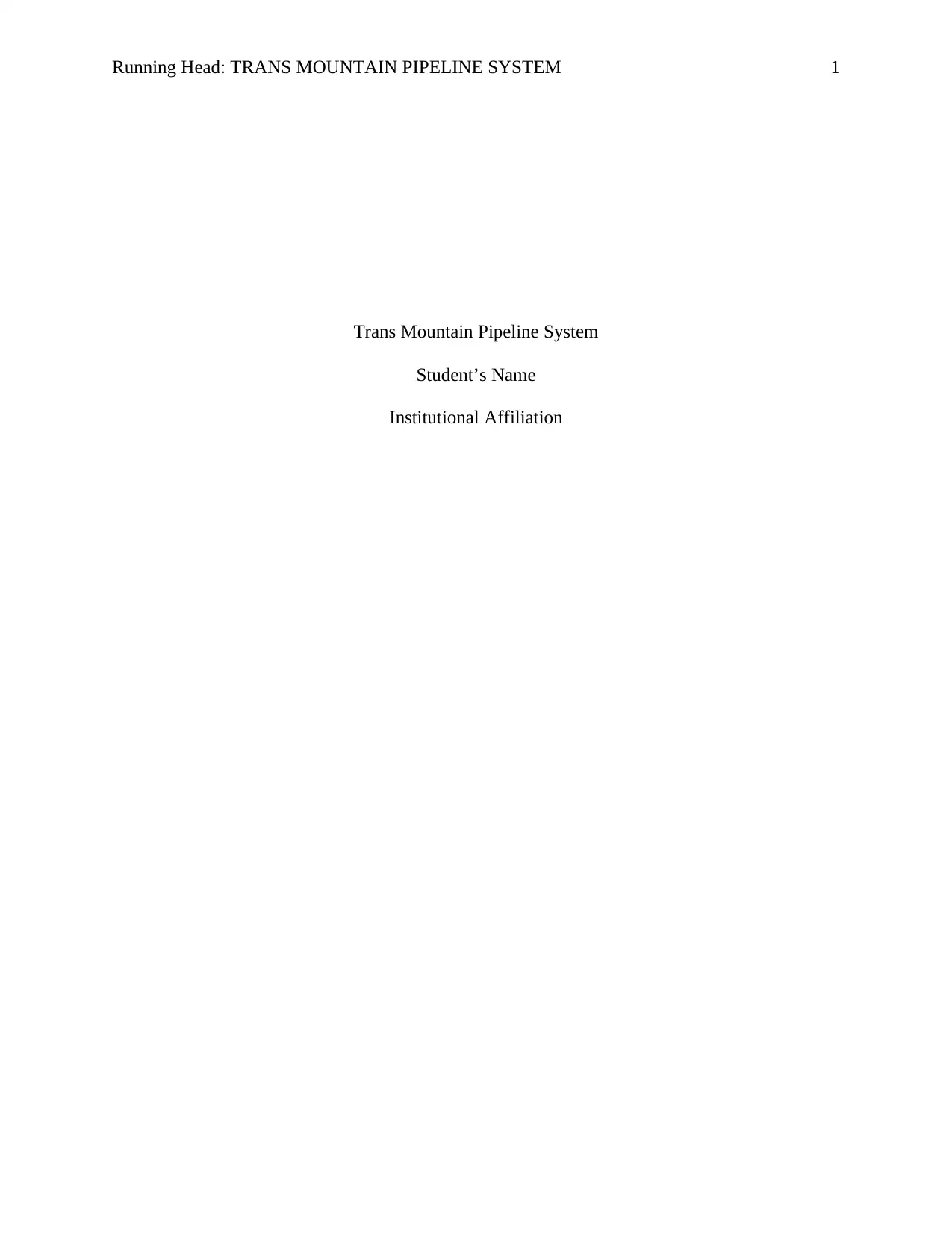
Running Head: TRANS MOUNTAIN PIPELINE SYSTEM 1
Trans Mountain Pipeline System
Student’s Name
Institutional Affiliation
Trans Mountain Pipeline System
Student’s Name
Institutional Affiliation
Paraphrase This Document
Need a fresh take? Get an instant paraphrase of this document with our AI Paraphraser
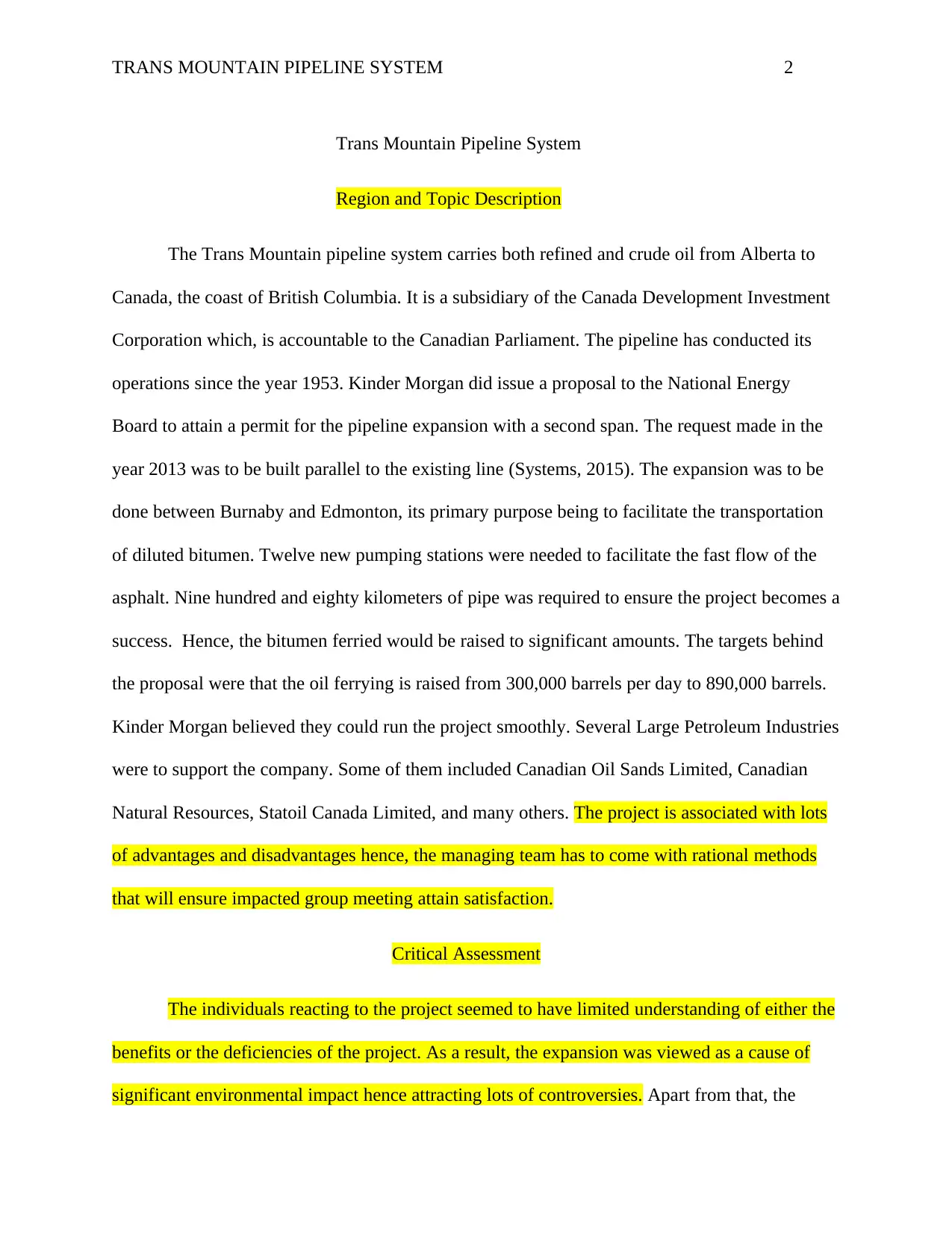
TRANS MOUNTAIN PIPELINE SYSTEM 2
Trans Mountain Pipeline System
Region and Topic Description
The Trans Mountain pipeline system carries both refined and crude oil from Alberta to
Canada, the coast of British Columbia. It is a subsidiary of the Canada Development Investment
Corporation which, is accountable to the Canadian Parliament. The pipeline has conducted its
operations since the year 1953. Kinder Morgan did issue a proposal to the National Energy
Board to attain a permit for the pipeline expansion with a second span. The request made in the
year 2013 was to be built parallel to the existing line (Systems, 2015). The expansion was to be
done between Burnaby and Edmonton, its primary purpose being to facilitate the transportation
of diluted bitumen. Twelve new pumping stations were needed to facilitate the fast flow of the
asphalt. Nine hundred and eighty kilometers of pipe was required to ensure the project becomes a
success. Hence, the bitumen ferried would be raised to significant amounts. The targets behind
the proposal were that the oil ferrying is raised from 300,000 barrels per day to 890,000 barrels.
Kinder Morgan believed they could run the project smoothly. Several Large Petroleum Industries
were to support the company. Some of them included Canadian Oil Sands Limited, Canadian
Natural Resources, Statoil Canada Limited, and many others. The project is associated with lots
of advantages and disadvantages hence, the managing team has to come with rational methods
that will ensure impacted group meeting attain satisfaction.
Critical Assessment
The individuals reacting to the project seemed to have limited understanding of either the
benefits or the deficiencies of the project. As a result, the expansion was viewed as a cause of
significant environmental impact hence attracting lots of controversies. Apart from that, the
Trans Mountain Pipeline System
Region and Topic Description
The Trans Mountain pipeline system carries both refined and crude oil from Alberta to
Canada, the coast of British Columbia. It is a subsidiary of the Canada Development Investment
Corporation which, is accountable to the Canadian Parliament. The pipeline has conducted its
operations since the year 1953. Kinder Morgan did issue a proposal to the National Energy
Board to attain a permit for the pipeline expansion with a second span. The request made in the
year 2013 was to be built parallel to the existing line (Systems, 2015). The expansion was to be
done between Burnaby and Edmonton, its primary purpose being to facilitate the transportation
of diluted bitumen. Twelve new pumping stations were needed to facilitate the fast flow of the
asphalt. Nine hundred and eighty kilometers of pipe was required to ensure the project becomes a
success. Hence, the bitumen ferried would be raised to significant amounts. The targets behind
the proposal were that the oil ferrying is raised from 300,000 barrels per day to 890,000 barrels.
Kinder Morgan believed they could run the project smoothly. Several Large Petroleum Industries
were to support the company. Some of them included Canadian Oil Sands Limited, Canadian
Natural Resources, Statoil Canada Limited, and many others. The project is associated with lots
of advantages and disadvantages hence, the managing team has to come with rational methods
that will ensure impacted group meeting attain satisfaction.
Critical Assessment
The individuals reacting to the project seemed to have limited understanding of either the
benefits or the deficiencies of the project. As a result, the expansion was viewed as a cause of
significant environmental impact hence attracting lots of controversies. Apart from that, the
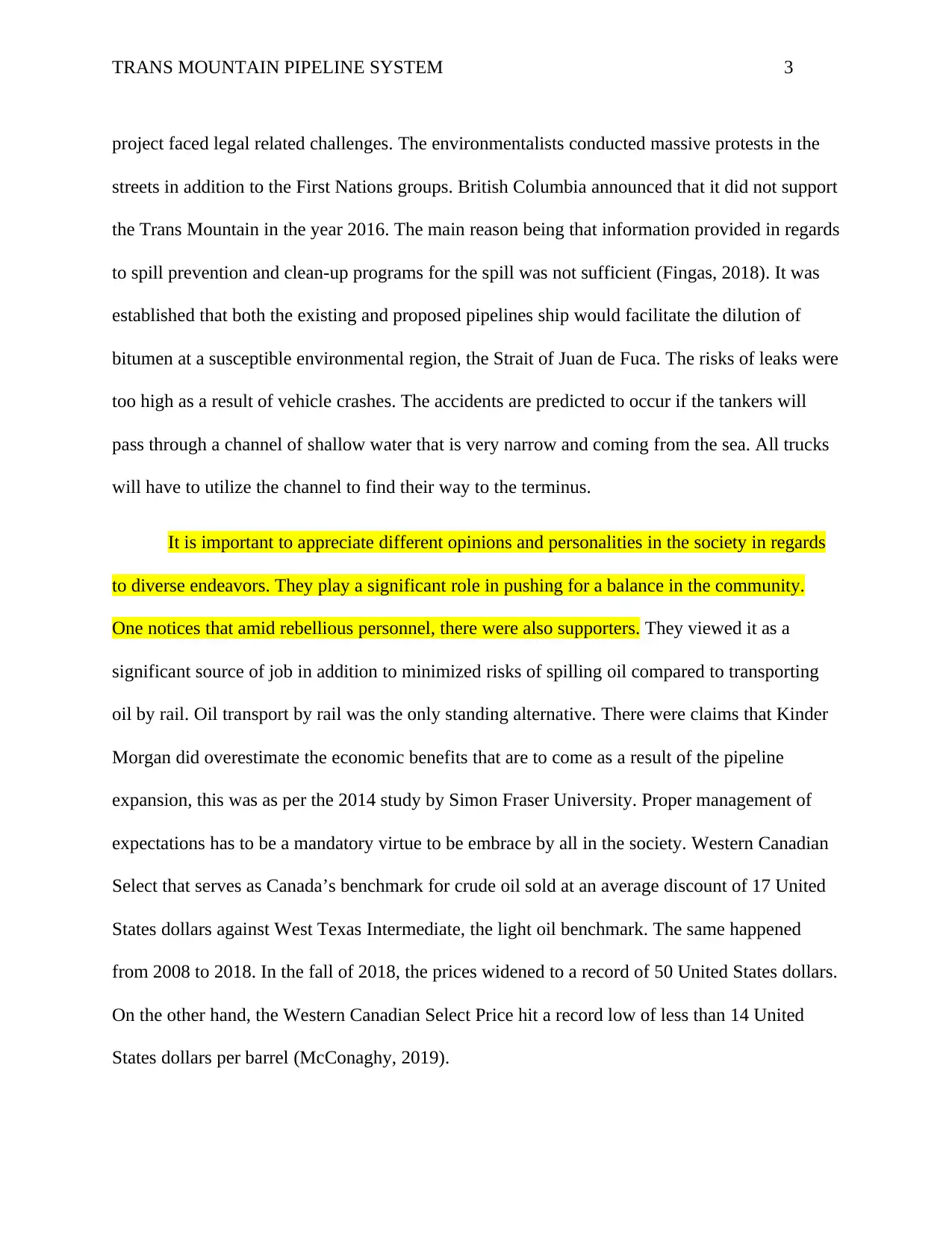
TRANS MOUNTAIN PIPELINE SYSTEM 3
project faced legal related challenges. The environmentalists conducted massive protests in the
streets in addition to the First Nations groups. British Columbia announced that it did not support
the Trans Mountain in the year 2016. The main reason being that information provided in regards
to spill prevention and clean-up programs for the spill was not sufficient (Fingas, 2018). It was
established that both the existing and proposed pipelines ship would facilitate the dilution of
bitumen at a susceptible environmental region, the Strait of Juan de Fuca. The risks of leaks were
too high as a result of vehicle crashes. The accidents are predicted to occur if the tankers will
pass through a channel of shallow water that is very narrow and coming from the sea. All trucks
will have to utilize the channel to find their way to the terminus.
It is important to appreciate different opinions and personalities in the society in regards
to diverse endeavors. They play a significant role in pushing for a balance in the community.
One notices that amid rebellious personnel, there were also supporters. They viewed it as a
significant source of job in addition to minimized risks of spilling oil compared to transporting
oil by rail. Oil transport by rail was the only standing alternative. There were claims that Kinder
Morgan did overestimate the economic benefits that are to come as a result of the pipeline
expansion, this was as per the 2014 study by Simon Fraser University. Proper management of
expectations has to be a mandatory virtue to be embrace by all in the society. Western Canadian
Select that serves as Canada’s benchmark for crude oil sold at an average discount of 17 United
States dollars against West Texas Intermediate, the light oil benchmark. The same happened
from 2008 to 2018. In the fall of 2018, the prices widened to a record of 50 United States dollars.
On the other hand, the Western Canadian Select Price hit a record low of less than 14 United
States dollars per barrel (McConaghy, 2019).
project faced legal related challenges. The environmentalists conducted massive protests in the
streets in addition to the First Nations groups. British Columbia announced that it did not support
the Trans Mountain in the year 2016. The main reason being that information provided in regards
to spill prevention and clean-up programs for the spill was not sufficient (Fingas, 2018). It was
established that both the existing and proposed pipelines ship would facilitate the dilution of
bitumen at a susceptible environmental region, the Strait of Juan de Fuca. The risks of leaks were
too high as a result of vehicle crashes. The accidents are predicted to occur if the tankers will
pass through a channel of shallow water that is very narrow and coming from the sea. All trucks
will have to utilize the channel to find their way to the terminus.
It is important to appreciate different opinions and personalities in the society in regards
to diverse endeavors. They play a significant role in pushing for a balance in the community.
One notices that amid rebellious personnel, there were also supporters. They viewed it as a
significant source of job in addition to minimized risks of spilling oil compared to transporting
oil by rail. Oil transport by rail was the only standing alternative. There were claims that Kinder
Morgan did overestimate the economic benefits that are to come as a result of the pipeline
expansion, this was as per the 2014 study by Simon Fraser University. Proper management of
expectations has to be a mandatory virtue to be embrace by all in the society. Western Canadian
Select that serves as Canada’s benchmark for crude oil sold at an average discount of 17 United
States dollars against West Texas Intermediate, the light oil benchmark. The same happened
from 2008 to 2018. In the fall of 2018, the prices widened to a record of 50 United States dollars.
On the other hand, the Western Canadian Select Price hit a record low of less than 14 United
States dollars per barrel (McConaghy, 2019).
⊘ This is a preview!⊘
Do you want full access?
Subscribe today to unlock all pages.

Trusted by 1+ million students worldwide
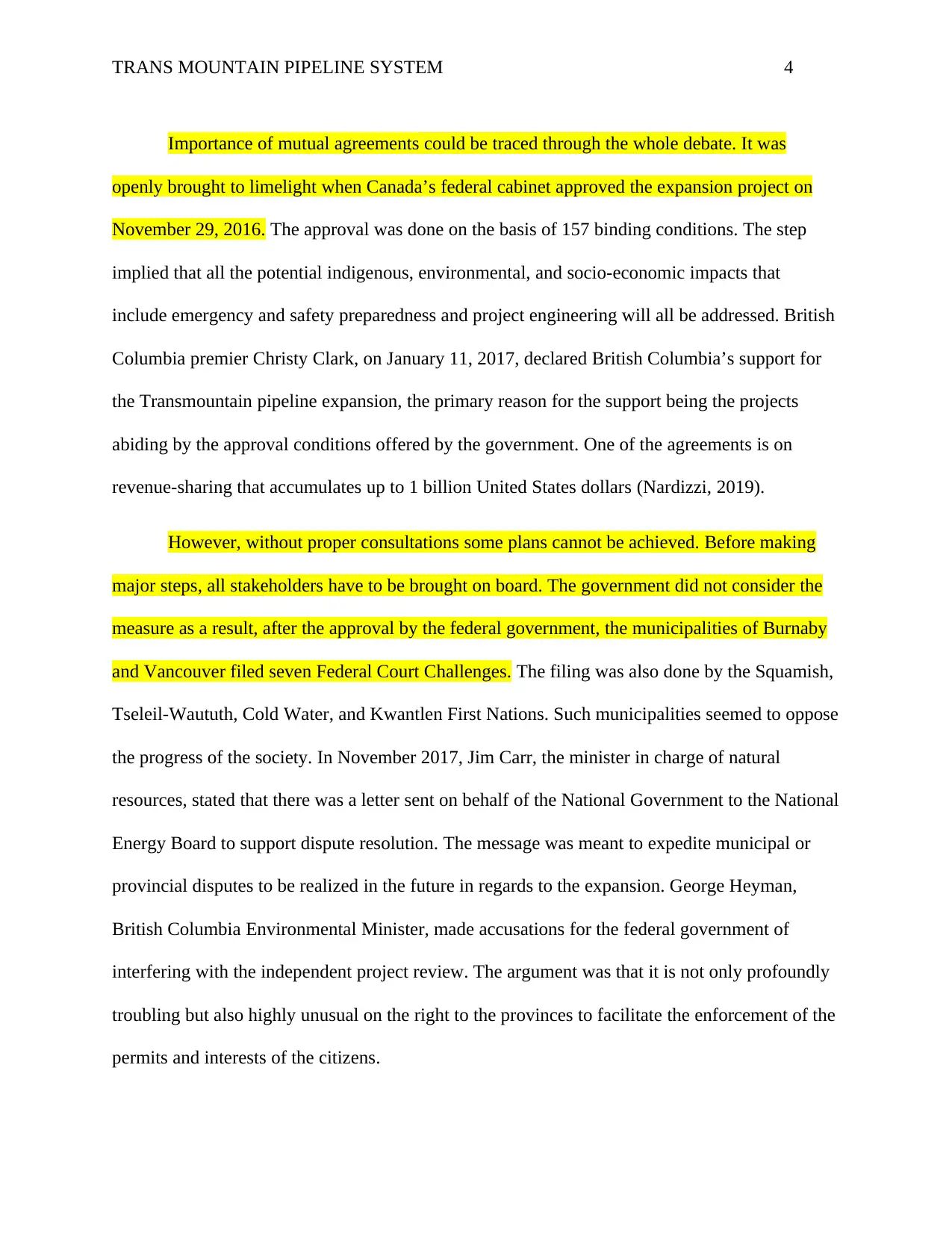
TRANS MOUNTAIN PIPELINE SYSTEM 4
Importance of mutual agreements could be traced through the whole debate. It was
openly brought to limelight when Canada’s federal cabinet approved the expansion project on
November 29, 2016. The approval was done on the basis of 157 binding conditions. The step
implied that all the potential indigenous, environmental, and socio-economic impacts that
include emergency and safety preparedness and project engineering will all be addressed. British
Columbia premier Christy Clark, on January 11, 2017, declared British Columbia’s support for
the Transmountain pipeline expansion, the primary reason for the support being the projects
abiding by the approval conditions offered by the government. One of the agreements is on
revenue-sharing that accumulates up to 1 billion United States dollars (Nardizzi, 2019).
However, without proper consultations some plans cannot be achieved. Before making
major steps, all stakeholders have to be brought on board. The government did not consider the
measure as a result, after the approval by the federal government, the municipalities of Burnaby
and Vancouver filed seven Federal Court Challenges. The filing was also done by the Squamish,
Tseleil-Waututh, Cold Water, and Kwantlen First Nations. Such municipalities seemed to oppose
the progress of the society. In November 2017, Jim Carr, the minister in charge of natural
resources, stated that there was a letter sent on behalf of the National Government to the National
Energy Board to support dispute resolution. The message was meant to expedite municipal or
provincial disputes to be realized in the future in regards to the expansion. George Heyman,
British Columbia Environmental Minister, made accusations for the federal government of
interfering with the independent project review. The argument was that it is not only profoundly
troubling but also highly unusual on the right to the provinces to facilitate the enforcement of the
permits and interests of the citizens.
Importance of mutual agreements could be traced through the whole debate. It was
openly brought to limelight when Canada’s federal cabinet approved the expansion project on
November 29, 2016. The approval was done on the basis of 157 binding conditions. The step
implied that all the potential indigenous, environmental, and socio-economic impacts that
include emergency and safety preparedness and project engineering will all be addressed. British
Columbia premier Christy Clark, on January 11, 2017, declared British Columbia’s support for
the Transmountain pipeline expansion, the primary reason for the support being the projects
abiding by the approval conditions offered by the government. One of the agreements is on
revenue-sharing that accumulates up to 1 billion United States dollars (Nardizzi, 2019).
However, without proper consultations some plans cannot be achieved. Before making
major steps, all stakeholders have to be brought on board. The government did not consider the
measure as a result, after the approval by the federal government, the municipalities of Burnaby
and Vancouver filed seven Federal Court Challenges. The filing was also done by the Squamish,
Tseleil-Waututh, Cold Water, and Kwantlen First Nations. Such municipalities seemed to oppose
the progress of the society. In November 2017, Jim Carr, the minister in charge of natural
resources, stated that there was a letter sent on behalf of the National Government to the National
Energy Board to support dispute resolution. The message was meant to expedite municipal or
provincial disputes to be realized in the future in regards to the expansion. George Heyman,
British Columbia Environmental Minister, made accusations for the federal government of
interfering with the independent project review. The argument was that it is not only profoundly
troubling but also highly unusual on the right to the provinces to facilitate the enforcement of the
permits and interests of the citizens.
Paraphrase This Document
Need a fresh take? Get an instant paraphrase of this document with our AI Paraphraser
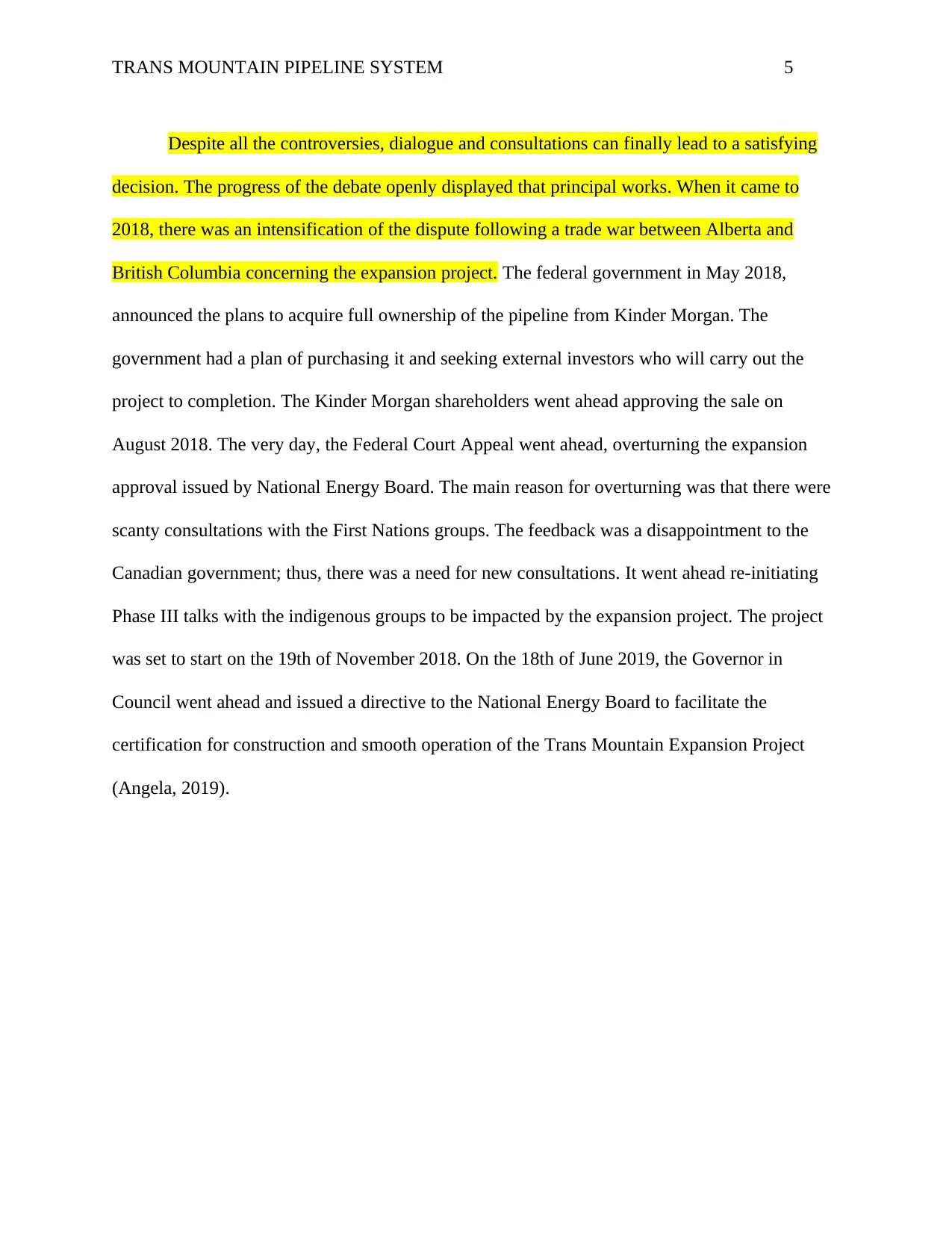
TRANS MOUNTAIN PIPELINE SYSTEM 5
Despite all the controversies, dialogue and consultations can finally lead to a satisfying
decision. The progress of the debate openly displayed that principal works. When it came to
2018, there was an intensification of the dispute following a trade war between Alberta and
British Columbia concerning the expansion project. The federal government in May 2018,
announced the plans to acquire full ownership of the pipeline from Kinder Morgan. The
government had a plan of purchasing it and seeking external investors who will carry out the
project to completion. The Kinder Morgan shareholders went ahead approving the sale on
August 2018. The very day, the Federal Court Appeal went ahead, overturning the expansion
approval issued by National Energy Board. The main reason for overturning was that there were
scanty consultations with the First Nations groups. The feedback was a disappointment to the
Canadian government; thus, there was a need for new consultations. It went ahead re-initiating
Phase III talks with the indigenous groups to be impacted by the expansion project. The project
was set to start on the 19th of November 2018. On the 18th of June 2019, the Governor in
Council went ahead and issued a directive to the National Energy Board to facilitate the
certification for construction and smooth operation of the Trans Mountain Expansion Project
(Angela, 2019).
Despite all the controversies, dialogue and consultations can finally lead to a satisfying
decision. The progress of the debate openly displayed that principal works. When it came to
2018, there was an intensification of the dispute following a trade war between Alberta and
British Columbia concerning the expansion project. The federal government in May 2018,
announced the plans to acquire full ownership of the pipeline from Kinder Morgan. The
government had a plan of purchasing it and seeking external investors who will carry out the
project to completion. The Kinder Morgan shareholders went ahead approving the sale on
August 2018. The very day, the Federal Court Appeal went ahead, overturning the expansion
approval issued by National Energy Board. The main reason for overturning was that there were
scanty consultations with the First Nations groups. The feedback was a disappointment to the
Canadian government; thus, there was a need for new consultations. It went ahead re-initiating
Phase III talks with the indigenous groups to be impacted by the expansion project. The project
was set to start on the 19th of November 2018. On the 18th of June 2019, the Governor in
Council went ahead and issued a directive to the National Energy Board to facilitate the
certification for construction and smooth operation of the Trans Mountain Expansion Project
(Angela, 2019).
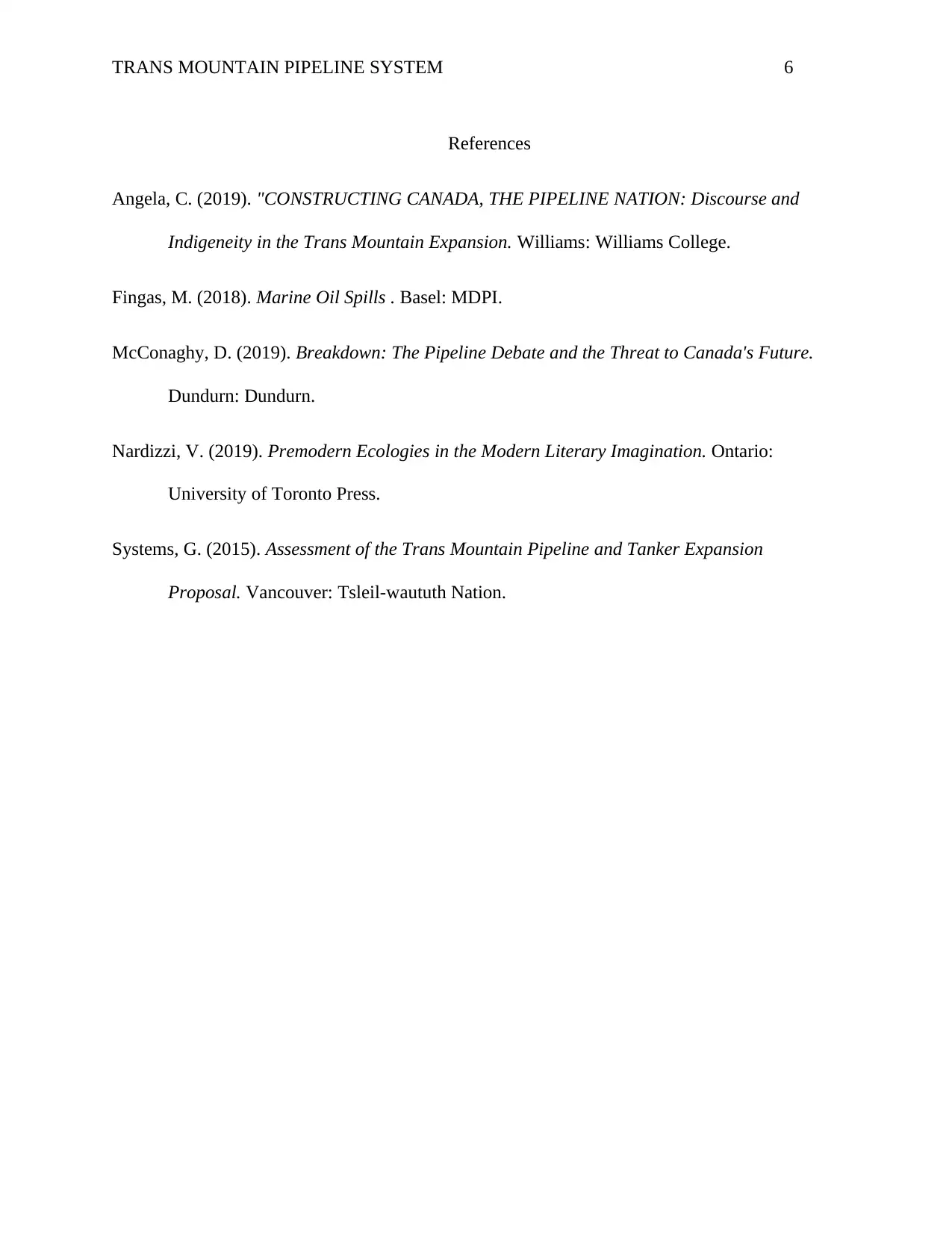
TRANS MOUNTAIN PIPELINE SYSTEM 6
References
Angela, C. (2019). "CONSTRUCTING CANADA, THE PIPELINE NATION: Discourse and
Indigeneity in the Trans Mountain Expansion. Williams: Williams College.
Fingas, M. (2018). Marine Oil Spills . Basel: MDPI.
McConaghy, D. (2019). Breakdown: The Pipeline Debate and the Threat to Canada's Future.
Dundurn: Dundurn.
Nardizzi, V. (2019). Premodern Ecologies in the Modern Literary Imagination. Ontario:
University of Toronto Press.
Systems, G. (2015). Assessment of the Trans Mountain Pipeline and Tanker Expansion
Proposal. Vancouver: Tsleil-waututh Nation.
References
Angela, C. (2019). "CONSTRUCTING CANADA, THE PIPELINE NATION: Discourse and
Indigeneity in the Trans Mountain Expansion. Williams: Williams College.
Fingas, M. (2018). Marine Oil Spills . Basel: MDPI.
McConaghy, D. (2019). Breakdown: The Pipeline Debate and the Threat to Canada's Future.
Dundurn: Dundurn.
Nardizzi, V. (2019). Premodern Ecologies in the Modern Literary Imagination. Ontario:
University of Toronto Press.
Systems, G. (2015). Assessment of the Trans Mountain Pipeline and Tanker Expansion
Proposal. Vancouver: Tsleil-waututh Nation.
⊘ This is a preview!⊘
Do you want full access?
Subscribe today to unlock all pages.

Trusted by 1+ million students worldwide
1 out of 6
Your All-in-One AI-Powered Toolkit for Academic Success.
+13062052269
info@desklib.com
Available 24*7 on WhatsApp / Email
![[object Object]](/_next/static/media/star-bottom.7253800d.svg)
Unlock your academic potential
Copyright © 2020–2026 A2Z Services. All Rights Reserved. Developed and managed by ZUCOL.


